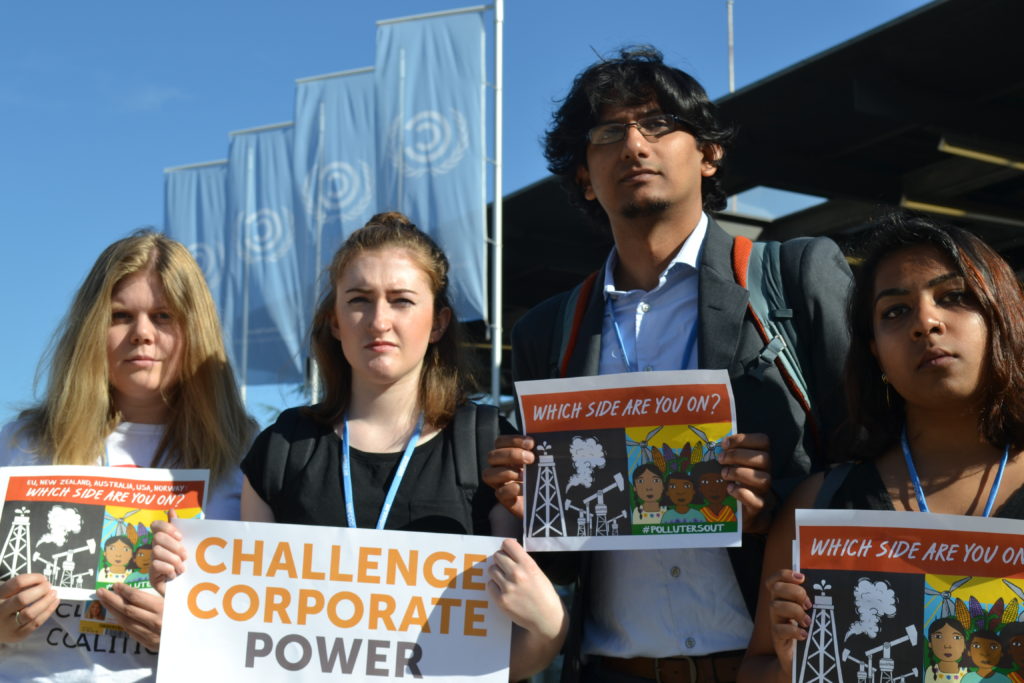
Sarah Dobson (UKYCC), Eilidh Robb (UKYCC), Sriram Madhusoodanan (Corporate Accountability), Aneesa Khan (Sustain US) at the Bonn climate meetings.
The U.N. climate talks wrapped up late last night in the plenary hall of the World Conference Center in Bonn, Germany.
Between the lines of technical text, diplomatic speeches, and plodding discussion, the global power dynamics between Global North and Global South—and between Big Polluters and people power—came into sharp focus over the last two weeks.
And so did the ways that we—the global climate justice community—are shifting those dynamics.
Here are three things to know about the outcomes of the Bonn climate talks:
1. The climate justice movement took a step forward toward bold, visionary climate solutions like those laid out in the People’s Demands for Climate Justice.
Governments from countries most affected by the climate crisis rejected obstructionist governments’ and Big Polluters’ push to make implementation of Article 6 of the Paris Agreement— the critical section on global collaboration to decrease emissions—focus solely on industry-driven market-based schemes. In Article 6 negotiating halls, governments from countries on the front lines of climate change pushed for things like ending fossil fuel subsidies, financing renewable energy technology, and more.
This is exactly what the global climate justice community intended when we all came together to launch the People’s Demands last year: to provide a true roadmap for governments to finally reject industry schemes and enter negotiating halls with concrete, bold, and just solutions. It’s a huge sign of progress to see them beginning to take hold.
And that wasn’t the only place where the power of the movement to kick Big Polluters out and advance climate justice was palpable at these talks….
2. The climate justice movement further exposed the U.S. government and left it standing on its own as a shill for polluters as it blocked a conflict-of-interest policy.
Going into these talks, we and our allies knew that, to advance a conflict-of-interest policy that could begin to kick Big Polluters out, we’d need to expose and challenge the U.S. government and its allies’ obstruction. So, with our partners in Bonn and around the world, we organized escalating actions through social media, video, email action, phone calls, and press conferences demanding Global North governments like the EU, Norway, Australia, and New Zealand side with people, not polluters and the U.S. government.
Over a series of five meetings, Global North governments, led by the U.S. and Australia, attempted to end debate on conflicts of interest… even as delegates representing nearly 50 countries called for such a policy. As the movement’s collective power grew over the week inside and outside the halls of the UNFCCC, the U.S. was increasingly alone in its shameless fronting for Big Polluter interests.
Nevertheless, the U.S. in the end used intimidation, distraction, and dirty tricks to block a conflict-of-interest policy from moving forward —for now. This doesn’t stop this issue from being placed back on the agenda next year. So you can be sure it’s not over.
3. The climate justice community is united in calling for governments to advance just, ambitious climate policy through the U.N. climate talks—and will not give up.
As news outlets around the world are reporting, the pace of progress at the U.N. climate talks fails to match the urgency of the climate crisis. The U.S. and Australia refused to address Big Polluters’ conflicting interests. A small handful of governments attempted to downplay the latest climate science. Global North governments dragged their feet on providing funding for loss and damage to countries most affected by the crisis—a top priority for Global South countries and the climate justice community.
Make no mistake: All of these represent serious injustice.
But we are determined to keep organizing for justice. Because we see the progress we can have on critical issues like Article 6. And because, as our partner Nathan Thanki of The Global Campaign to Demand Climate Justice said, speaking at the closing press conference organized by members of the climate justice community: “You can’t have a tug-of-war without a rope. This is an arena that we have a fight in.”
His words are a potent reminder that social change simply isn’t linear. The popular myth is that seismic change comes by bouncing from victory to victory in an ever-growing crescendo of inevitable progress. But the truth is, it looks more like a game of tug-of-war: a few steps forward, a few steps back.
The climate justice movement is adding more power and more players to our side of the rope, while the U.S., other obstructionist governments, and Big Polluters stand more and more alone.
As we look toward COP25 in Chile this December, we know we’ll have a big fight ahead of us. Finalizing the Article 6 guidelines is shaping up to be THE big topic on the agenda there, and it’s a top priority for Big Polluters to make sure their profits are protected. But we can already see how the global climate justice movement, powered by people like you all over the world, is shifting some pretty entrenched power dynamics.
We’re ready. Governments on the front lines of climate change are ready. The climate justice community is ready. And our ranks are only growing.
In fact, we’re on stronger footing than ever before to secure just, visionary climate solutions that work for people, not polluters.
Thank you for being a part of this movement, and for all you do to build a just future for all.
The Bonn talks may be over, but you can keep up with our climate campaign on our blog, Facebook, Twitter, LinkedIn, and Instagram.
This is the last post in “Polluters out, people in!“–our series of dispatches from the global climate talks in Germany. Read more here.


